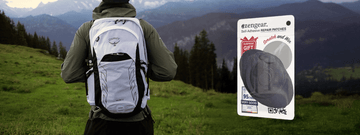How to Cope if You Get Lost on a Wild Hike or Camping Trip
by Emily Jannet on Jul 28, 2022
Nobody sets out on a wild hike or camping trip with the goal of getting lost. Even so, it is a scenario that cannot ever be ruled entirely out of the equation.
Even if you are heading out into an area you know well, it is still perfectly possible to lose your way. More often than not, getting a little lost when off the beaten track is easily remedied. But when you find yourself well and truly lost in an unfamiliar place, it can be a genuinely terrifying experience.
Of course, the best advice is to take every possible step to avoid getting lost in the first place. Much of which lies in careful planning and preparation, which will help you stay safe when out and about in the wilderness.
For example, experts recommend the following to anyone planning a wild camping trip or hike of any kind:
- Pack at least one tool with a compass and learn how to use it with a map.
- If possible, take a portable GPS location device along for the ride.
- Thoroughly study as many maps and guidebooks of the area as possible, in order to familiarise yourself with its most important features and landmarks
- Make sure you tell at least one responsible person exactly where you are going, and when they can expect you to return. Let them know that they should raise the alarm if you are not back on time.
- Carry an emergency power bank for your mobile phone and do not use it unless you absolutely need to.
- Plan every aspect of your route ahead of time and try to avoid venturing too far from signed paths or trails.
- Keep an eye on the weather forecast and avoid heading out in poor visibility conditions.
- Mark your progress on your map as you continue your journey, and head the same way back if you begin to lose your way.
Of course, none of the above will prove particularly helpful or comforting in the event that you find yourself lost. Knowing how to react and respond if you lose your way is therefore essential, as is avoiding the most common mistakes made by those who lose their way.
Product Spotlight:
Paracord Survival Bracelet (5 in 1): Flint and Steel Fire Starter, Whistle, Compass, Mini Saw
- 5 in 1 EMERGENCY SURVIVAL KIT - each bracelet consists of a fire flint starter, loud 100dB whistle, basic compass, mini saw and waterproof military-grade paracord
- ADJUSTABLE BAND SIZE - this tactical first aid bracelet fits to wrists measuring 7’’-9.5’’ or 17-24cm (from kids and women to big men)
- MILITARY-GRADE PARACHUTE CORD - up to 10.5 feet (3.2m) of waterproof 7-core paracord can be used to create a shelter, trap, raft, stop bleeding, serve as tinder to start a fire, create a clothesline to dry your wet garments, splint your injured leg against a branch or carry heavy objects (up to 550lb or 250kg)
- BE PREPARED FOR COLD WEATHER - this fire starter kit is portable and ideal for outdoor adventures such as camping, hiking, hunting, fishing, boating. It can protect you from cold which is the #1 cause of death
What To Do if You Get Lost
The first thing you need to do if you find yourself lost in an unfamiliar location is take the time to rest and calm yourself down. Feelings of fear and panic may be inevitable, but have a tendency to lead to poor decision-making. Now is the time that calls for logical and rational thinking, so sit down and take a few minutes to compose yourself.
Take out your map and carefully study your surroundings. Are there any clearly identifiable features on the map that you may be able to see? Would walking up to a higher vantage point give you a clearer view of the area? Could you simply use your compass in conjunction with your map to position yourself at least a little closer to where you started your journey?
It’s also important to take note of the time, if you told someone where you were going and when you planned to return. This will give you a good idea of how long it will take for the alarm to be raised, then for a search and rescue team to find you. In the meantime, don’t be tempted to leave the area and potentially get yourself even more lost.
Stay where you are, take note of your provisions and build a shelter if necessary. Stay warm and dry, build a signal fire (if it is safe to do so) and blow loudly on your emergency whistle every couple of minutes. Make your location as visible as possible and just as long as someone knows where you are, there’s a good chance you’ll be rescued long before your provisions run out.






